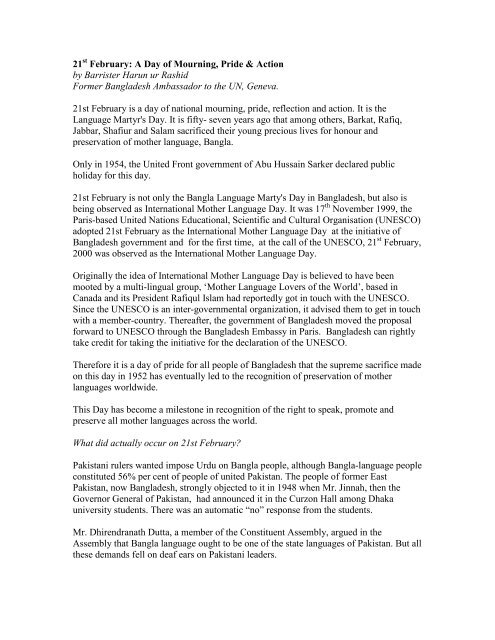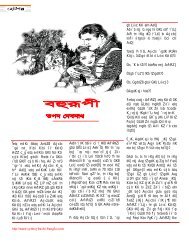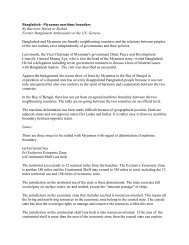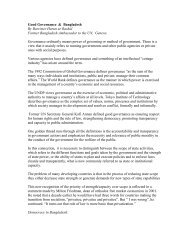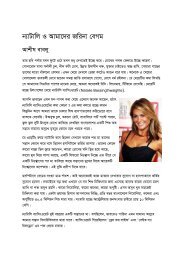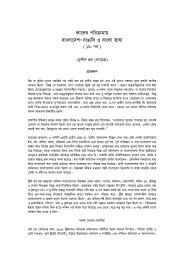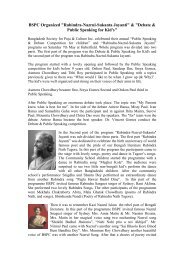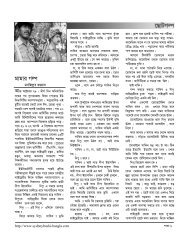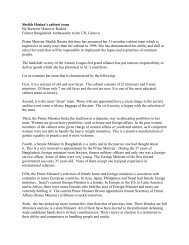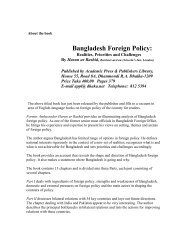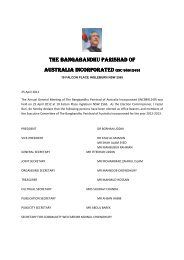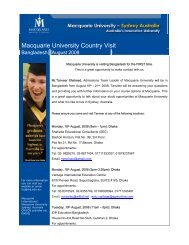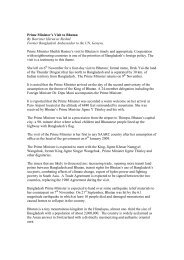21 February - Sydneybashi-Bangla.Com
21 February - Sydneybashi-Bangla.Com
21 February - Sydneybashi-Bangla.Com
You also want an ePaper? Increase the reach of your titles
YUMPU automatically turns print PDFs into web optimized ePapers that Google loves.
<strong>21</strong> st <strong>February</strong>: A Day of Mourning, Pride & Action<br />
by Barrister Harun ur Rashid<br />
Former <strong>Bangla</strong>desh Ambassador to the UN, Geneva.<br />
<strong>21</strong>st <strong>February</strong> is a day of national mourning, pride, reflection and action. It is the<br />
Language Martyr's Day. It is fifty- seven years ago that among others, Barkat, Rafiq,<br />
Jabbar, Shafiur and Salam sacrificed their young precious lives for honour and<br />
preservation of mother language, <strong>Bangla</strong>.<br />
Only in 1954, the United Front government of Abu Hussain Sarker declared public<br />
holiday for this day.<br />
<strong>21</strong>st <strong>February</strong> is not only the <strong>Bangla</strong> Language Marty's Day in <strong>Bangla</strong>desh, but also is<br />
being observed as International Mother Language Day. It was 17 th November 1999, the<br />
Paris-based United Nations Educational, Scientific and Cultural Organisation (UNESCO)<br />
adopted <strong>21</strong>st <strong>February</strong> as the International Mother Language Day at the initiative of<br />
<strong>Bangla</strong>desh government and for the first time, at the call of the UNESCO, <strong>21</strong> st <strong>February</strong>,<br />
2000 was observed as the International Mother Language Day.<br />
Originally the idea of International Mother Language Day is believed to have been<br />
mooted by a multi-lingual group, ‘Mother Language Lovers of the World’, based in<br />
Canada and its President Rafiqul Islam had reportedly got in touch with the UNESCO.<br />
Since the UNESCO is an inter-governmental organization, it advised them to get in touch<br />
with a member-country. Thereafter, the government of <strong>Bangla</strong>desh moved the proposal<br />
forward to UNESCO through the <strong>Bangla</strong>desh Embassy in Paris. <strong>Bangla</strong>desh can rightly<br />
take credit for taking the initiative for the declaration of the UNESCO.<br />
Therefore it is a day of pride for all people of <strong>Bangla</strong>desh that the supreme sacrifice made<br />
on this day in 1952 has eventually led to the recognition of preservation of mother<br />
languages worldwide.<br />
This Day has become a milestone in recognition of the right to speak, promote and<br />
preserve all mother languages across the world.<br />
What did actually occur on <strong>21</strong>st <strong>February</strong><br />
Pakistani rulers wanted impose Urdu on <strong>Bangla</strong> people, although <strong>Bangla</strong>-language people<br />
constituted 56% per cent of people of united Pakistan. The people of former East<br />
Pakistan, now <strong>Bangla</strong>desh, strongly objected to it in 1948 when Mr. Jinnah, then the<br />
Governor General of Pakistan, had announced it in the Curzon Hall among Dhaka<br />
university students. There was an automatic “no” response from the students.<br />
Mr. Dhirendranath Dutta, a member of the Constituent Assembly, argued in the<br />
Assembly that <strong>Bangla</strong> language ought to be one of the state languages of Pakistan. But all<br />
these demands fell on deaf ears on Pakistani leaders.
The immediate starting point of the tragedy of <strong>21</strong>st <strong>February</strong> is that on 27th January,<br />
1952, the then Prime Minister of Pakistan Khwaja Nazimuddin announced at a public<br />
meeting that Urdu alone should be the state language of Pakistan. The students were<br />
infuriated on the announcement.<br />
On <strong>21</strong>st <strong>February</strong>, 1952, agitated unarmed students, both male and female, of Dhaka<br />
University decided to violate Section 144 (prohibiting an assembly more than five<br />
persons) Order in order to proceed to the elected members of the East Pakistan<br />
Legislative Assembly ( near SM Hall) to present their demand.<br />
On their way at the site of the Medical College students’ hostel number 12, at 3-30 PM,<br />
the police opened fire on the peaceful procession of students by an order of a Magistrate<br />
(a West Pakistani). Jabbar and Rafiq died on the spot, while three others died later in<br />
hospital ( an impromptu monument had been set up by Medical College Students on the<br />
site of the current Shaheed Minar ) It is believed that many more were killed including a<br />
boy of ten year old but their bodies were taken away by the police and were secretly<br />
buried. The rest is history.<br />
Importance of mother languages :<br />
Mother language is what a baby child communicates for the first time with mother and<br />
father. It is a language a person never forgets, wherever that person lives. The mother<br />
language is a prism that determines the first notions of the world to a baby child. The<br />
umbilical cord between mother tongue and thought is inseparable. It is the mother tongue<br />
that represents thought, culture and heritage of an individual.<br />
Scottish historian and essayist Thomas Carlyle (1795-1881) called the language "the<br />
body of thought". This implies that if a mother tongue is crushed, thoughts and ideas will<br />
inevitably die.<br />
About 6 912 mother languages are thought to exist today. But social, demographic and<br />
political factors are all contributing to their rapid disappearance. Language experts say<br />
that half of the number is likely to disappear as smaller ethnic societies are gradually<br />
being assimilated into mainstream national and global cultures. For example, the<br />
language, Middle Chulym, now spoken by a handful Siberian townsfolk (45 in number),<br />
has integrated into Russian language and once the last fluent speaker dies, the language<br />
will be extinct.<br />
What is lost when a language is lost is another world, according to many language<br />
experts Valuable ethnographic and cultural information disappears when a language dies,<br />
leaving a gap in understanding of the variable cognitive structures of which human brain<br />
is capable.<br />
Studies of different languages have revealed vastly different ways of representing and<br />
interpreting the world. For instance, some Native American and Australian Aboriginal<br />
languages reveal a completely different understanding of the relationship between nature
and human beings and how it affects their lives.<br />
Language experts believe that as mother languages disappear, a few dominant languages<br />
will exist, such as English, French, Spanish and Chinese, for commerce, education,<br />
science and culture in the world the disappearance of mother languages will be a severe<br />
blow to linguistic diversity, cognitive science and cultural studies.<br />
<strong>Bangla</strong>desh is a multi-lingual country, although <strong>Bangla</strong> is overwhelmingly spoken in the<br />
country by all. The majority people should ensure that indigenous languages among tribal<br />
and adhivashi people in <strong>Bangla</strong>desh must not disappear. They must be promoted. Lingual<br />
variety will enrich our nation.<br />
Importance of <strong>Bangla</strong> language<br />
Language is an issue on which people of <strong>Bangla</strong>desh feel deeply and rightly so. It<br />
represents the thought, culture and heritage of <strong>Bangla</strong>desh. Anyone who wishes to gain<br />
an insight into the conditions of life in <strong>Bangla</strong>desh and to peer into social structures<br />
cannot do better than to study <strong>Bangla</strong> language and literature.<br />
Of all the languages in South Asia, <strong>Bangla</strong> is the first to develop a literature of a very<br />
high order and still holds the model for other languages. <strong>Bangla</strong> language is unique in the<br />
sense that it has many varieties of way to describe an object. For example, in English an<br />
“eye” has only one expression to describe but in Bengali an “eye” can be described more<br />
than one way (akhi, nayan, chok, padmalochon etc).<br />
<strong>Bangla</strong> writers in the past and present have enriched the language by transfusing Sanskrit,<br />
Persian, Arabic and English languages in it. <strong>Bangla</strong> was raised to its highest fame by<br />
Rabindranath Thakur (Tagore) when he was awarded in 1913 the Nobel Prize for<br />
Literature.<br />
Have the ideals of the Martyrs' Day fulfilled<br />
During almost 37 years of independence, the question for everyone is whether the<br />
authorities and civil society have achieved the real significance of the Day. The test lies<br />
whether all people irrespective of age and gender can read and write.<br />
Free adult education is necessary for mature people, free education together with free<br />
learning equipment and school dress for poor children is imperative. In recent years drop<br />
out from schools of poor students (almost 50%) has become a big problem.<br />
Yearly Book Fair:<br />
Since 1979, the Ekushey <strong>February</strong> Book Fair at the <strong>Bangla</strong>desh Academy premises began<br />
to honour the occasion. The fair will achieve its purpose if visitors to the bookstalls are<br />
able to buy good quality books with affordable prices.
This year (2009) until 16 th <strong>February</strong>, it is reported that 1,489 new books are added to the<br />
book fair. Out of these books 339 are related to poetry, 265 novels, 177 short stories, 190<br />
essays, 45 well-researched books and 45 biographies.<br />
On 18 th <strong>February</strong> (2009) the famous singer from Kolkata Manna Dey visited the fair and<br />
he was surprised to note the love for Bengali books by the people in the country<br />
It has been argued by many serious writers that some publishers. to make quick profit,<br />
urge popular writers to write novels and love stories for the fair. Since the <strong>Bangla</strong><br />
Academy has nothing to say on the quality of published books at the fair, it has arguably<br />
become a purely commercial venture, exploiting young minds and sentiments.<br />
Some argue the very purpose of the month-long Ekushey book fair is defeated by cheap<br />
quality of many books as they do not disseminate knowledge.<br />
Another difficulty is that all books are not available from one book stall because each<br />
publisher has its own stall (300-400 stalls in the fair) and a buyer has to move around all<br />
the book stalls to buy books of his/her choice. The need for cooperation or coordination<br />
among publishers is to be addressed for the benefit of book lovers.<br />
Another matter is to be considered by the Academy whether the book fair can be held in<br />
various parts of the Dhaka metropolitan city for access to all, especially for elderly who<br />
cannot stand for long in the queue to enter into the fair.<br />
Every <strong>Bangla</strong>deshi has a right to read books in <strong>Bangla</strong>. But the price of <strong>Bangla</strong> books has<br />
become very expensive because the printing paper and other materials for publishing<br />
books are costly. The government may consider in exempting tax and custom duties on<br />
printing paper and other materials so as to make books easily available to readers at an<br />
affordable price. A knowledge nation does not grow automatically. It needs to be<br />
carefully developed and nurtured.<br />
Conclusion:<br />
<strong>21</strong>st <strong>February</strong> is more than a language movement for people of <strong>Bangla</strong>desh. Many<br />
historians think <strong>21</strong>st <strong>February</strong> laid the seed of the foundation of a separate state of<br />
<strong>Bangla</strong>desh on the basis of Bengali nationalism that was aptly summed up by<br />
Bangabandhu Sheikh Mujib when he said: “I am Bengali, my nationalism is Bengali.”


